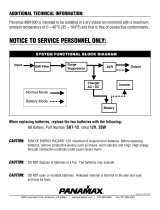
12
Dangerous Goods by Road (ADR). Lithium-ion cells and batteries
have been tested to section 38.3 of the UN Recommendations on the
Transport of Dangerous Goods Manual of Tests and Criteria.
In most instances, shipping a
battery pack will be excepted
from being classified as a fully regulated Class 9 Hazardous Material.
In general, only shipments containing a lithium-ion battery with an
energy rating greater than 100 Watt Hours (Wh) will require being
shipped as fully regulated Class 9. All lithium-ion batteries have the
Watt Hour rating marked on the pack. Furthermore, due to regulation
complexities,
does not recommend air shipping lithium-ion
battery packs alone regardless of Watt Hour rating. Shipments of tools
with batteries (combo kits) can be air shipped as excepted if the Watt
Hour rating of the battery pack is no greater than 100 Whr.
Regardless of whether a shipment is considered excepted or fully
regulated, it is the shipper’s responsibility to consult the latest
regulations for packaging, labeling/marking and documentation
requirements.
The information provided in this section of the manual is provided in
good faith and believed to be accurate at the time the document was
created. However, no warranty, expressed or implied, is given. It is
the buyer’s responsibility to ensure that its activities comply with the
applicable regulations.
TRANSPORTING THE FLEXVOLT BATTERY
The D
WALT FLEXVOLT battery has two modes: Use and Transport.
Use Mode: When the FLEXVOLT battery stands alone or is in a
D
WALT 18V product, it will operate as an 18V battery. When the
FLEXVOLT battery is in a 54V or a 108V (two 54V batteries) product, it
will operate as a 54V battery.
Transport Mode: When the cap is attached to the FLEXVOLT battery,
the battery is in transport mode. Keep the cap for shipping.
When in Transport mode, strings of cells are
electrically disconnected within the pack
resulting in 3 batteries with a lower Watt
hour (Wh) rating as compared to 1 battery
with a higher Watt hour rating. This






















